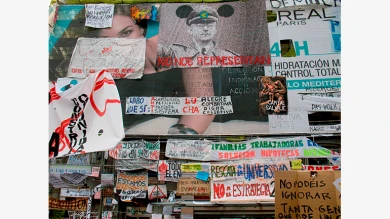-
Friday, 1 October 2021 – 5pm Sabatini Building, Auditorium
Session 1
TicketsJean Renoir. La Marseillaise
France, 1938, b/w, original version in French with Spanish subtitles, 135’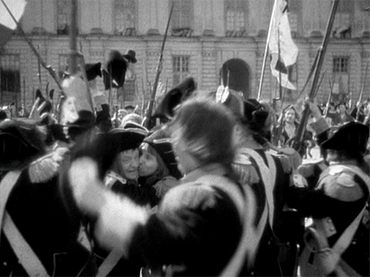
-
Saturday, 2 October 2021 – 5pm Sabatini Building, Auditorium
Session 2
TicketsBill Douglas. Comrades
UK, 1986, colour, original version in English with Spanish subtitles, 183’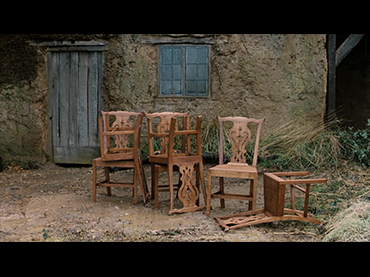
-
Friday, 8 October 2021 – 6pm Sabatini Building, Auditorium
Session 3
TicketsGrigori Kozintsev and Leonid Trauberg. Novyy Vavilon (The New Babylon)
USSR, 1929, b/w, silent with intertitles in Russian translated into Spanish, 93’
Version restored by La Cineteca del Friuli-Archivo Cinema FVG (Fondo Brenno Miselli-Gastone Predieri), with an original score by Dimitri Shostakovich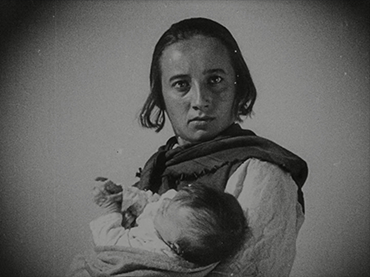
-
Saturday, 9 October 2021 – 6pm Sabatini Building, Auditorium
Session 4
TicketsAndré Malraux. L’Espoir (Days of Hope)
Spain and France, 1938–1939, b/w, original version in Spanish, 88’
Digital version produced from 35mm conserved in Filmoteca Española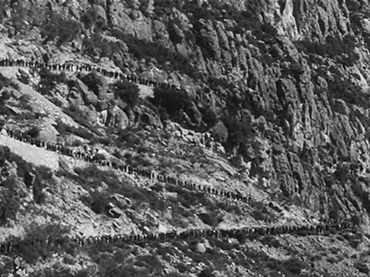
-
Friday, 15 October 2021 – 6pm Sabatini Building, Auditorium
Session 5
TicketsChris Marker. Le Train en marche (The Train Rolls On)
France, 1973, b/w, original version in French with Spanish subtitles, 32’Dziga Vertov. Šestaja čast' mira (A Sixth Part of the World)
USSR, 1926, b/w, silent with intertitles in Russian translated into Spanish, 73’
Digital version restored by Filmmuseum Vienna, with music by Michael Nyman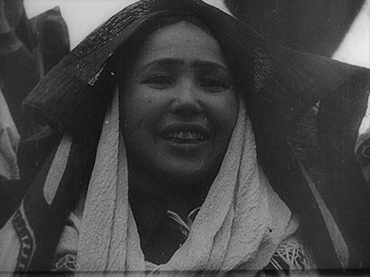
-
Saturday, 16 October 2021 – 6pm Sabatini Building, Auditorium
Session 6
TicketsGroupe Medvedkine de Besançon. Classe de lutte (The Class of Struggle)
France, 1969, b/w, original version in French with Spanish subtitles, 40’Michel Desrois. Lettre à mon ami Pol Cèbe (A Letter to My Friend Pol Cèbe)
France, 1970, colour, original version in French with Spanish subtitles, 17’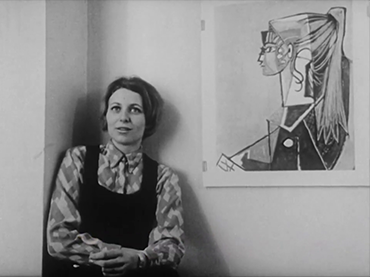
-
Friday, 22 October 2021 – 5pm Sabatini Building, Auditorium
Session 7
TicketsBarbara Kopple. Harlan County U.S.A.
USA, 1976, colour, original version in English with Spanish subtitles, 103’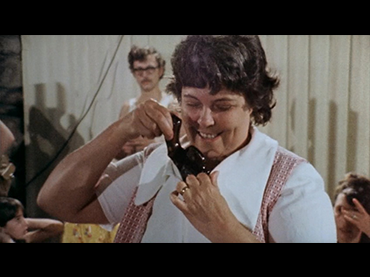
-
Saturday, 23 October 2021 – 5pm Sabatini Building, Auditorium
Session 8
TicketsShinsuke Ogawa. Sanrizuka: Dainitoride no hitobito (The Peasants of the Second Fortress)
Japan, 1971, b/w, original version in Japanese with Spanish subtitles, 143’
Digital version produced for this screening by the Athénée Français Cultural Center, Tokyo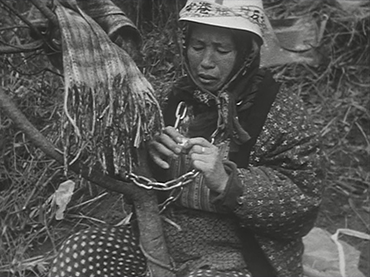
-
Friday, 29 October 2021 – 5pm Sabatini Building, Auditorium
Session 9
TicketsThomas Harlan. Torre Bel
Portugal, 1975, colour, original version in Portuguese with Spanish subtitles, 136’Acknowledgements: Tabakalera. International Centre for Contemporary Culture
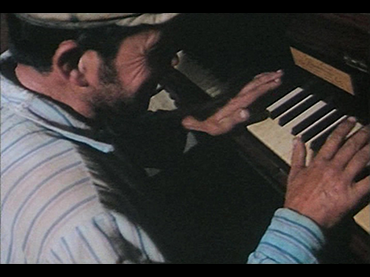
-
Saturday, 30 October 2021 – 5pm Sabatini Building, Auditorium
Session 10
TicketsJean-Marie Straub and Danièle Huillet. Operai, contadini (Workers, Peasants)
Italy and France, 2001, colour, original version in Italian with Spanish subtitles, 123’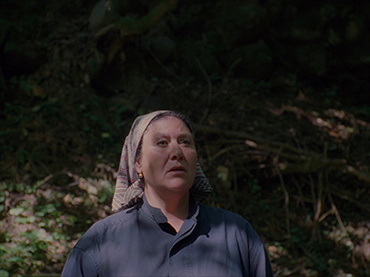
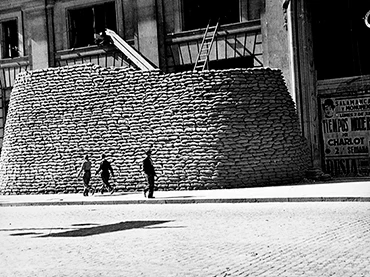
Held on 01 Oct 2021
Juan Pando Barrero. Pyramid of Sandbags Covering the Telefónica Building, 1938. Spanish Cultural Heritage Institute, Madrid, Ministry of Culture and Sport
Gökşin Sipahioğlu. Police in Paris, Boulevard Saint-Michel, 10 May 1968. Sipa Press
Cinema has spent a century or more informing about happiness and, in the sense of shaping, modelling imaginaries and desires. This film series assembles twelve feature-length, medium-length and short films that bear witness to a form of little-known happiness — public happiness — and is set forth in connection with the documentary exhibition under the same title, comprising a diptych devoted to the citizen ideal and social utopia.
“Happiness is a new idea in Europe”, Louis de Saint-Just declared in 1794 to conclude his speech in support of the redistribution of national wealth by decree. This break with tradition was not the sentiment in itself, the urbane privilege of the few and an uncertain reward later down the line for the many. It was about anybody being able to feel it, about the right to happiness for all. The history of this happiness passes by in flashes and is written with a lower-case h, for it is led by anonymous people who are absent from textbooks. Each time the order of domination is interrupted it appears. Someone leaves a family home in Marseilles, a thatched cottage in Tolpuddle, another prefab house without running water in Harlan County to take care of matters of common interest, and it appears. Public happiness is nothing other than the fulfilment associated with living politically, assembling with others, organising, acting together and discovering oneself by opening out and anticipating a desired world, one that is based even on modest and trivial claims, exceeding them entirely.
The ways of showing this happiness possess the same unpredictability as politics. La Marseillaise by Jean Renoir (1938), a piece of fiction which unfolds to the backdrop of the years of the French Revolution, feels like a newsreel, while Thomas Harlan’s 1975 documentary Torre Bela, set in the Carnation Revolution, fashions its own character and even a leader. The most emotive film ever shot by a cluster of workers, Lettre à mon ami Pol Cèbe by Michel Desrois (1970), is pure experimental cinema. Operai, contadini, by Jean-Marie Straub and Danièle Huillet (2001), the only wholly fictional work in the series, and not based on “real events”, comprises various people reciting chapters from a novel in the middle of a forest. Countless images that do not coincide with images expected of a revolution. A couple of palaces are taken, granted, but bringing about a revolution is also about a peasant’s fingers — too swollen for the keys — ultimately playing the piano; separating him from his usual instrument, the hoe, and bringing those fingers into contact with keys for which they were never intended. It could last a moment or a lifetime.
Curator
All films will be screened in digital format, except for session 9 (Thomas Harlan. Torre Bela).
Más actividades

Institutional Decentralisation
Thursday, 21 May 2026 – 5:30pm
This series is organised by equipoMotor, a group of teenagers, young people and older people who have participated in the Museo Reina Sofía’s previous community education projects, and is structured around four themed blocks that pivot on the monstrous.
This fourth and final session centres on films that take the museum away from its axis and make it gaze from the edges. Pieces that work with that which is normally left out: peripheral territories, unpolished aesthetics, clumsy gestures full of intent. Instead of possessing an institutional lustre, here they are rough, precarious and strange in appearance, legitimate forms of making and showing culture. The idea is to think about what happens when central authority is displaced, when the ugly and the uncomfortable are not hidden, when they are recognised as part of the commons. Film that does not seek to be to one’s liking, but to open space and allow other ways of seeing and inhabiting the museum to enter stage.
![Tracey Rose, The Black Sun Black Star and Moon [La luna estrella negro y negro sol], 2014.](https://recursos.museoreinasofia.es/styles/small_landscape/public/Obra/AD07091_2.jpg.webp)
On Black Study: Towards a Black Poethics of Contamination
Monday 27, Tuesday 28 and Wednesday 29 of April, 2026 – 16:00 h
The seminar On Black Study: Towards a Black Poethics of Contamination proposes Black Study as a critical and methodological practice that has emerged in and against racial capitalism, colonial modernity and institutional capture. Framed through what the invited researcher and practitioner Ishy Pryce-Parchment terms a Black poethics of contamination, the seminar considers what it might mean to think Blackness (and therefore Black Study) as contagious, diffuse and spreadable matter. To do so, it enacts a constellation of diasporic methodologies and black aesthetic practices that harbor “contamination” -ideas that travel through texts, geographies, bodies and histories- as a method and as a condition.
If Blackness enters Western modernity from the position of the Middle Passage and its afterlives, it also names a condition from which alternative modes of being, knowing and relating are continually forged. From within this errant boundarylessness, Black creative-intellectual practice unfolds as what might be called a history of touches: transmissions, residues and socialities that unsettle the fantasy of pure or self-contained knowledge.
Situated within Black radical aesthetics, Black feminist theory and diasporic poetics, the seminar traces a genealogy of Black Study not as an object of analysis but as methodological propositions that continue to shape contemporary aesthetic and political life. Against mastery as the horizon of study, the group shifts attention from what we know to how we know. It foregrounds creative Black methodological practices—fahima ife’s anindex (via Fred Moten), Katherine McKittrick’s expansive use of the footnote, citation as relational and loving labour, the aesthetics of Black miscellanea, and Christina Sharpe’s practices of annotation—as procedures that disorganise dominant regimes of knowledge. In this sense, Black Study is approached not as a discrete academic field but as a feel for knowing and knowledge: a constellation of insurgent practices—reading, gathering, listening, annotating, refusing, world-making—that operate both within and beyond the university.
The study sessions propose to experiment with form in order to embrace how ‘black people have always used interdisciplinary methodologies to explain, explore, and story the world.’ Through engagements with thinkers and practitioners such as Katherine McKittrick, C.L.R. James, Sylvia Wynter, Christina Sharpe, Fred Moten, Tina Campt, Hilton Als, John Akomfrah, fahima ife and Dionne Brand, we ask: What might it mean to study together, incompletely and without recourse to individuation? How might aesthetic practice function as a poethical intervention in the ongoing work of what Sylvia Wynter calls the practice of doing humanness?

Intergenerationality
Thursday, 9 April 2026 – 5:30pm
This series is organised by equipoMotor, a group of teenagers, young people and older people who have participated in the Museo Reina Sofía’s previous community education projects, and is structured around four themed blocks that pivot on the monstrous.
The third session gazes at film as a place from which to dismantle the idea of one sole history and one sole time. From a decolonial and queer perspective, it explores films which break the straight line of past-present-future, which mix memories, slow progress and leave space for rhythms which customarily make no room for official accounts. Here the images open cracks through which bodies, voices and affects appear, disrupting archive and questioning who narrates, and from where and for whom. The proposal is at once simple and ambitious: use film to imagine other modes of remembering, belonging and projecting futures we have not yet been able to live.

Remedios Zafra
Thursday March 19, 2026 - 19:00 h
The José Luis Brea Chair, dedicated to reflecting on the image and the epistemology of visuality in contemporary culture, opens its program with an inaugural lecture by essayist and thinker Remedios Zafra.
“That the contemporary antifeminist upsurge is constructed as an anti-intellectual drive is no coincidence; the two feed into one another. To advance a reactionary discourse that defends inequality, it is necessary to challenge gender studies and gender-equality policies, but also to devalue the very foundations of knowledge in which these have been most intensely developed over recent decades—while also undermining their institutional support: universities, art and research centers, and academic culture.
Feminism has been deeply linked to the affirmation of the most committed humanist thought. Periods of enlightenment and moments of transition toward more just social forms—sustained by education—have been when feminist demands have emerged most strongly. Awareness and achievements in equality increase when education plays a leading social role; thus, devaluing intellectual work also contributes to harming feminism, and vice versa, insofar as the bond between knowledge and feminism is not only conceptual and historical, but also intimate and political.
Today, antifeminism is used globally as the symbolic adhesive of far-right movements, in parallel with the devaluation of forms of knowledge emerging from the university and from science—mistreated by hoaxes and disinformation on social networks and through the spectacularization of life mediated by screens. These are consequences bound up with the primacy of a scopic value that for some time has been denigrating thought and positioning what is most seen as what is most valuable within the normalized mediation of technology. This inertia coexists with techno-libertarian proclamations that reactivate a patriarchy that uses the resentment of many men as a seductive and cohesive force to preserve and inflame privileges in the new world as techno-scenario.
This lecture will address this epochal context, delving into the synchronicity of these upsurges through an additional parallel between forms of patriarchal domination and techno-labor domination. A parallel in which feminism and intellectual work are both being harmed, while also sending signals that in both lie emancipatory responses to today’s reactionary turns and the neutralization of critique. This consonance would also speak to how the perverse patriarchal basis that turns women into sustainers of their own subordination finds its equivalent in the encouraged self-exploitation of cultural workers; in the legitimation of affective capital and symbolic capital as sufficient forms of payment; in the blurring of boundaries between life and work and in domestic isolation; or in the pressure to please and comply as an extended patriarchal form—today linked to the feigned enthusiasm of precarious workers, but also to technological adulation. In response to possible resistance and intellectual action, patriarchy has associated feminists with a future foretold as unhappy for them, equating “thought and consciousness” with unhappiness—where these have in fact been (and continue to be) levers of autonomy and emancipation.”
— Remedios Zafra

27th Contemporary Art Conservation Conference
Wednesday, 4, and Thursday, 5 March 2026
The 27th Contemporary Art Conservation Conference, organised by the Museo Reina Sofía’s Department of Conservation and Restoration, with the sponsorship of the Mapfre Foundation, is held on 4 and 5 March 2026. This international encounter sets out to share and debate experience and research, open new channels of study and reflect on conservation and the professional practice of restorers.
This edition will be held with in-person and online attendance formats, occurring simultaneously, via twenty-minute interventions followed by a five-minute Q&A.
